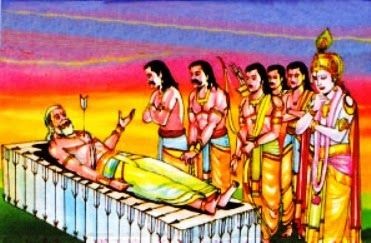आब्रह्मस्तम्बपर्यन्ते भूतग्रामे चतुर्विधे।
विज्ञस्यैव हि सामर्थ्य मिच्छानिच्छाविवर्जने॥
"Of the 4 categories of Existence, from Brahmā down to a Grass Blade,
It is the Wise One alone who has the capacity to renounce Desires & Aversions.
(1/7)
#Aṣṭāvakra
विज्ञस्यैव हि सामर्थ्य मिच्छानिच्छाविवर्जने॥
"Of the 4 categories of Existence, from Brahmā down to a Grass Blade,
It is the Wise One alone who has the capacity to renounce Desires & Aversions.
(1/7)
#Aṣṭāvakra

According to the Upaniṣads,
Đ Total World of beings Dwelling in the Surface of this Globe, Falls under 4 Types :
~Jarāyuja or Garbhaja: Those that are Born from the Womb;
~Aṇḍaja: Those that are Born from Eggs;
~Svedaja: Those that are Born from Warm vapour or Sweat;
Đ Total World of beings Dwelling in the Surface of this Globe, Falls under 4 Types :
~Jarāyuja or Garbhaja: Those that are Born from the Womb;
~Aṇḍaja: Those that are Born from Eggs;
~Svedaja: Those that are Born from Warm vapour or Sweat;

&
~Udbhijja: Those that are Born of Seeds or Sprouting Up.
All these together indicate the entire World of beings that exists here amidst Us.
In order to Indicate the Entire Cosmos,
Janaka Amplifies his Statement & Says,
"From the Creator down to a Grass Blade".
~Udbhijja: Those that are Born of Seeds or Sprouting Up.
All these together indicate the entire World of beings that exists here amidst Us.
In order to Indicate the Entire Cosmos,
Janaka Amplifies his Statement & Says,
"From the Creator down to a Grass Blade".

In Short,
In the Entire Cosmos of Created Beings,
Đ Man of Realisation Alone is the sole being who has in Him the Unique Capacity to Renounce all his Desires & Aversions.
These Two feelings Represent the entire Activities of the Mind.
In the Entire Cosmos of Created Beings,
Đ Man of Realisation Alone is the sole being who has in Him the Unique Capacity to Renounce all his Desires & Aversions.
These Two feelings Represent the entire Activities of the Mind.

The Man of Perfection alone is the one who has gone Beyond his Mind &
hence this Uniqueness in Him.
There is No Ego in Him
&, therefore,
He does Not React to the External World,
in terms of
Likes & Dislikes
or
in terms of
Desires & Aversions.
hence this Uniqueness in Him.
There is No Ego in Him
&, therefore,
He does Not React to the External World,
in terms of
Likes & Dislikes
or
in terms of
Desires & Aversions.

Our Mind is Coloured by Our Perceptions
& therefore,
loaded down with their Own vāsanās.
Đ Mind lives its days in Self-Created Bondages.
The Liberated One is He who has renounced the World of Perceptions,
meaning who has Risen above his Mind
& has Apprehended the Self.
& therefore,
loaded down with their Own vāsanās.
Đ Mind lives its days in Self-Created Bondages.
The Liberated One is He who has renounced the World of Perceptions,
meaning who has Risen above his Mind
& has Apprehended the Self.

This is the Burden of a Mantra in Mahopaniṣad :
"In case You Depend upon the World of Perceptions,
Then your Mind is Bound.
In case Your Mind has fully Renounced the World of Perceptions,
Then your Mind is Liberated."
ll ॐ तत् सत् ll🙏
"In case You Depend upon the World of Perceptions,
Then your Mind is Bound.
In case Your Mind has fully Renounced the World of Perceptions,
Then your Mind is Liberated."
ll ॐ तत् सत् ll🙏

• • •
Missing some Tweet in this thread? You can try to
force a refresh









